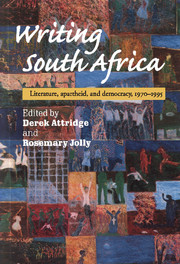Book contents
- Frontmatter
- Contents
- Contributors
- Acknowledgements and note on references
- South Africa, 1930–1996: a chronology
- Maps
- 1 Introduction
- 2 Interrogating silence: new possibilities faced by South African literature
- 3 I am dead: you cannot read: André Brink's On the Contrary
- 4 Endings and new beginning: South African fiction in transition
- 5 The post-apartheid sublime: rediscovering the extraordinary
- 6 Postmodernism and black writing in South Africa
- 7 Shame and identity: the case of the coloured in South Africa
- 8 A man's world: South African gay writing and the State of Emergency
- 9 The final safari: on nature, myth, and the literature of the Emergency
- 10 Interview
- 11 Speech and silence in the fictions of J.M.Coetzee
- 12 ‘Dialogue’ and ‘fulfilment’ in J.M. Coetzee's Age of Iron
- 13 Interview
- 14 Inside out: Jeremy Cronin's lyrical politics
- 15 Spinning out the present: narrative, gender, and the politics of South African theatre
- 16 South African theatre in the United States: the allure of the familiar and of the exotic
- Position papers
- Select bibliography: South African literary writing in English, 1970–1995
- Index
15 - Spinning out the present: narrative, gender, and the politics of South African theatre
Published online by Cambridge University Press: 05 July 2011
- Frontmatter
- Contents
- Contributors
- Acknowledgements and note on references
- South Africa, 1930–1996: a chronology
- Maps
- 1 Introduction
- 2 Interrogating silence: new possibilities faced by South African literature
- 3 I am dead: you cannot read: André Brink's On the Contrary
- 4 Endings and new beginning: South African fiction in transition
- 5 The post-apartheid sublime: rediscovering the extraordinary
- 6 Postmodernism and black writing in South Africa
- 7 Shame and identity: the case of the coloured in South Africa
- 8 A man's world: South African gay writing and the State of Emergency
- 9 The final safari: on nature, myth, and the literature of the Emergency
- 10 Interview
- 11 Speech and silence in the fictions of J.M.Coetzee
- 12 ‘Dialogue’ and ‘fulfilment’ in J.M. Coetzee's Age of Iron
- 13 Interview
- 14 Inside out: Jeremy Cronin's lyrical politics
- 15 Spinning out the present: narrative, gender, and the politics of South African theatre
- 16 South African theatre in the United States: the allure of the familiar and of the exotic
- Position papers
- Select bibliography: South African literary writing in English, 1970–1995
- Index
Summary
In 1988, a time of the most massive repression the country has ever known, the 500th anniversary of the ‘discovery’ of South Africa by the Portuguese explorer Bartolomeu Dias was commemorated in the small seaside resort of Mossel Bay. Three white actors in a rowing boat landed on a ‘whites-only’ beach, there to be welcomed by seven more whites wearing curly wigs and painted black. This simple ceremony was applauded by some 2,000 people, including the then President, P. W. Botha, in full regalia, with his cabinet. The spectacle would have been complete were it not for the absence of the local black population – an action precipitated by a ‘Coloured’ high-school teacher, who had warned the authorities that unless beach apartheid were ended, he and his pupils at least would not welcome Mr Dias back.
This event demonstrates a number of things. First of all, it suggests the complex absurdity of race politics in the country. Secondly, it registers the importance of theatrical representation or performance, broadly defined, in constructing a people's view of themselves – in this case, that of the white ruling class. And thirdly, it reveals the peculiar and persistent nature of the colonial imagination in a society which, although nominally independent, has long continued to exhibit the typical features of a colonial culture. Not only do the whites enact a version of the country's history which begins with the arrival of the Europeans; but the social, political, and legal superstructures they have set up exclude black people, so defined, even from this representation.
- Type
- Chapter
- Information
- Writing South AfricaLiterature, Apartheid, and Democracy, 1970–1995, pp. 204 - 220Publisher: Cambridge University PressPrint publication year: 1998



